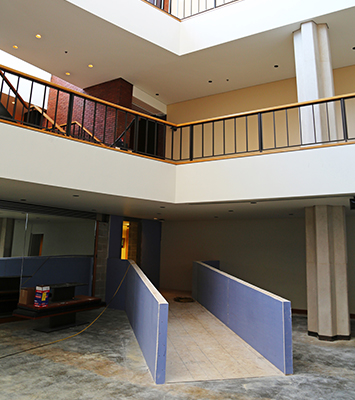Major Accessibility Upgrades Underway

September 2020
Krannert Center holds a long-standing commitment to improving accessibility around the arts. Part of that pledge is lived by continuing to seek ways in which the facility itself can be more navigable for everyone in our community. Though the building is currently closed to the public due to the pandemic, there’s been exciting work happening within.
This summer, crews have been hard at work implementing accessibility upgrades to both the Foellinger Great Hall and the Tryon Festival Theatre at Krannert Center. In the Tryon Festival Theatre, workers have widened the lower-foyer side entrances, and the carpet in the lower foyer is being replaced with a lower material to allow for easier wheelchair use. Inside the theatre, the “score” seats across the back of the main floor are being removed, and the flooring and steps in that area have been leveled out to create four additional wheelchair-accessible spots across the back-left and back-right sides.
Meanwhile, in the Foellinger Great Hall lower and upper foyers, the carpet has also been replaced. Along the northwest wall of the lower foyer, a new opening and a ramp have been created to allow patrons who use wheelchairs to navigate from Krannert Center’s north elevator to this lower foyer. As in the Tryon Festival Theatre, the Great Hall’s score seats will be removed, along with the back row of seating, to allow for 15 wheelchair-accessible and no-step spots across the back of the main floor. In the balcony, select flooring and steps will be leveled to allow for more few-step and no-step seats and six wheelchair-accessible spots. The public restrooms in the lower foyer will also be upgraded to fully comply with the Americans with Disabilities Act standards.
The Colwell Playhouse, which presents some of the greatest challenges to accessibility, is currently in the design proposal stage, and the Center hopes to go forward with additional renovations to that space by the summer of 2021.
Cindi Howard, Krannert Center’s Associate Director for Finance and Operations, notes that the Center is “ . . . extremely grateful to the University of Illinois at Urbana-Champaign for prioritizing and funding this mission-critical construction project that represents the Center’s values of inclusivity and accessibility.” Howard also praised the university’s Facilities and Services staff who were willing to pivot their schedules during the pandemic in order to take advantage of the opportunity to fast-track this work while theatres were empty. Howard shared that, “Because of the hard work of the Facilities and Services team, a project that would have spanned several years under normal conditions will now be complete this semester.”
Learn more about Krannert Center’s enduring commitment to accessibility.
